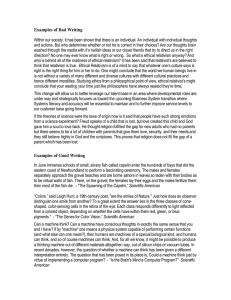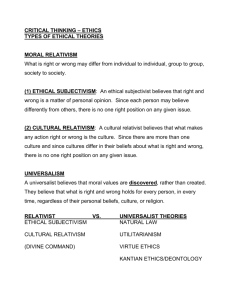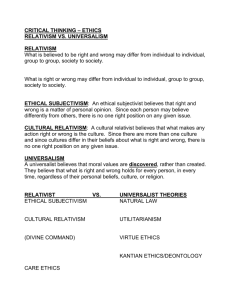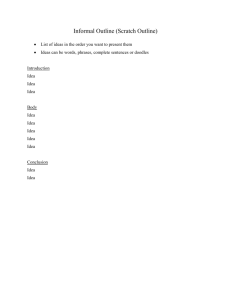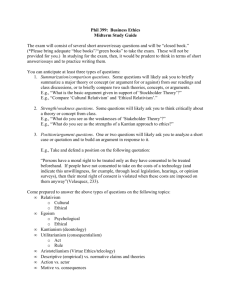2-templates
advertisement
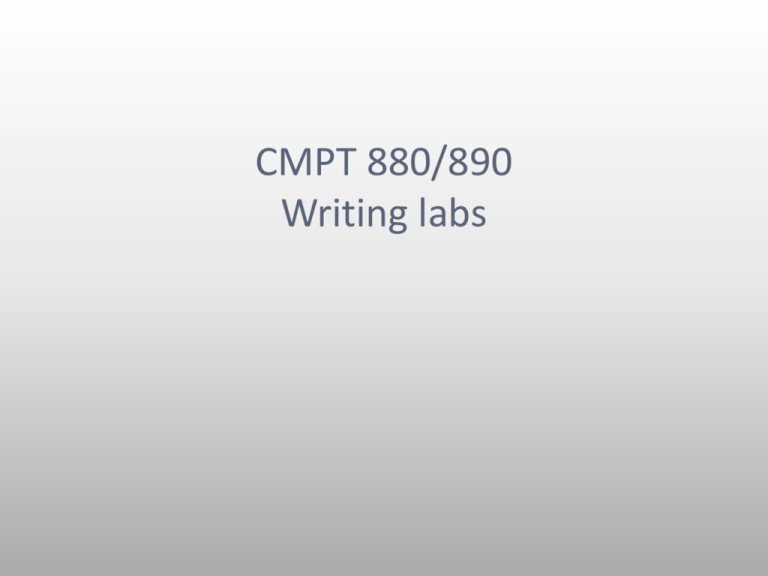
CMPT 880/890 Writing labs Outline How to be a better writer Working on mechanics: the, comma Research writing as template The “problem / motivation / solution / evaluation” template The “claim / reason / evidence” template Identifying problems in paragraphs How to become a better writer Care about becoming a better writer Have something to say Read good writing Read what you write Take apart your paragraphs Read out loud Think about different ways to say the same thing Work on mechanics Work on argument We had been wandering, indeed, in the leafless shrubbery an hour in the morning; but since dinner (Mrs. Reed, when there was no company dined early) the cold winter wind had brought with it clouds so somber, and a rain so penetrating, that further outdoor exercise was now out of the question. Working on mechanics How do you become a better grammarian? Rules Practice Listen And today, the comma Templates for research writing Many kinds of research papers and theses have very similar structures and stories Templates: a fill-in-the-blanks approach A good way to get started with technical writing But also useful throughout your career! Two templates: “problem / motivation / solution / evaluation” “claim / reason / evidence” Problem/Motivation/Solution/Evaluation “What’s the contribution”? The Problem: In many areas of computer science, our research is about solving problems Problems of the real world E.g., “it is too time-consuming to learn a foreign language” Problems defined by the research community E.g., “there is no known constant-time algorithm for XYZ” Problem/Motivation/Solution/Evaluation The Motivation: Why is the problem worth solving? Who cares, and why? Can you relate the problem to: Money Health and safety Happiness Problem/Motivation/Solution/Evaluation The Solution: What did you do about the problem? E.g., what did you do to make it easier to learn a foreign language E.g., you found a constant-time algorithm for XYZ (How did you go about solving the problem) Problem/Motivation/Solution/Evaluation The Evaluation: How do we know that your solution is a good solution to the original problem? Start to think in terms of problems, motivations, solutions, and evaluations! Argument template Claim Reason Evidence Part III of The Craft of Research Finding problems in writing The other key aspect of this thesis is availability. This is defined as how accessible an individual is. It is in many ways the other half of the natural interaction of awareness. While others are aware of you, you are available to them. In this context, it is the level of social interaction that you are capable of or willing to be a part of. Whereas awareness is the interpretation by others of data about you, availability relates more to the raw data (embodiment, location, activity) about you as an individual. Where awareness is the metaphor for the social status you provide, availability contains the semantic information that you present. Finding problems in writing Read the paragraph and think about: what is the topic of the paragraph? what is the argument? what is the writer trying to accomplish in the paragraph inform or convince? if only inform, then why? is the main point stated early? the ‘topic sentence’ do the sentences support the paragraph’s argument? what do the sentences themselves say? and what expectations do they implicitly introduce? Finding problems in writing This change will allow us to better leverage our talent base in an area where developmental roles are under way and strategically focuses us toward the upcoming Business System transition where Systems literacy and accuracy will be essential to maintain and to further improve service levels to our customer base going forward. Finding problems in writing Within our society, it has been shown that there is an individual. An individual with individual thoughts and actions. But who determines whether or not he is correct in their choices? Are our thoughts brain washed through the media with it’s hellish ideas or our closet friends that try to direct us in the right direction? No one may ever know what is right or wrong. So what is ethical relativism anyway? And who is behind all of the madness of ethical relativism? It has been said that relativist’s are believed to think that relativism is true. Ethical Relativism is of a mind to say that whatever one’s culture says is right is the right thing for him or her to do. One might conclude that the world we human beings live in is not without a variety of many different and diverse cultures with different cultural practices and hence different moralities. Studying ethics from a philosophical point of view, ethical relativist’s might conclude that your wasting your time just like philosophers have always wasted they’re time. Finding problems in writing In order to simplify the process of designing augmented interactions for WIMP interfaces, we present a conceptual framework that is based on a high-level view of a user’s interaction with a GUI. The framework has at its core the idea of an interaction, which we define as a combination of an object in the interface with one or more actions, each of which have a characteristic degree of freedom. Interactions are undertaken in service of a user task, and are supported by input mechanisms that provide the actual input data. In the following sections we describe each part of the framework in more detail, starting with the idea of an interaction. Finding problems in writing Natural pointing, and natural gestural communication in general, are important parts of supporting rich and expressive communication and collaboration in collaborative virtual environments (CVEs). It is still unclear, however, whether the problems of ordinary pointing require the addition of ‘magic’ powers; there is almost no information about how accurately people are when they point in realworld situations, and no data at all about the accuracy of pointing in CVEs. In this paper, we investigate this issue and explore the accuracy of pointing in both the real world and in CVEs.
